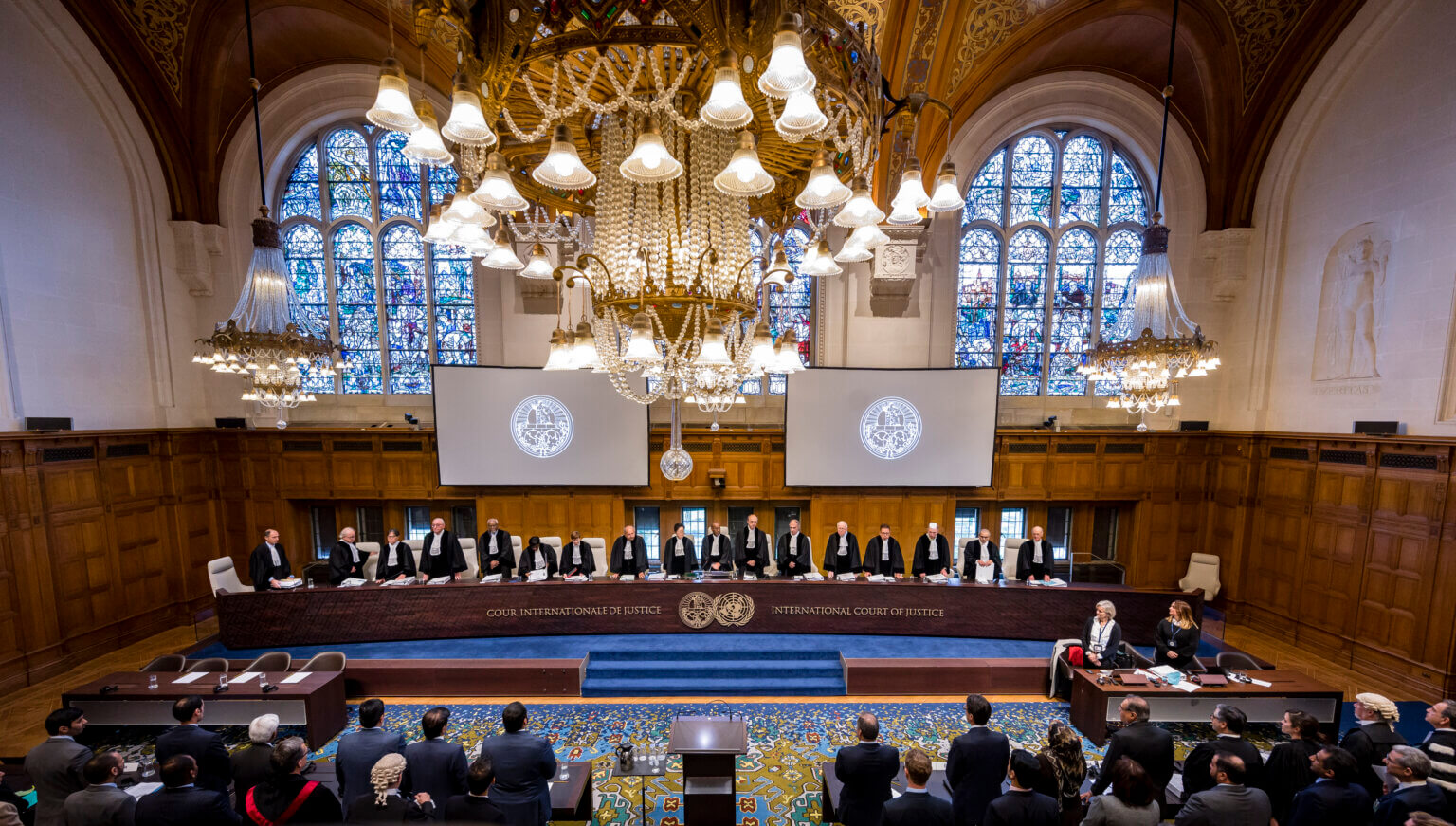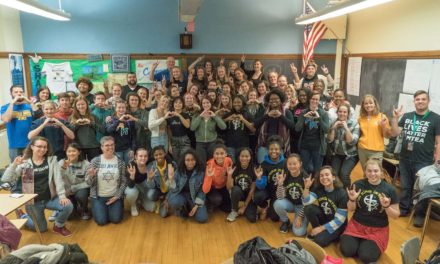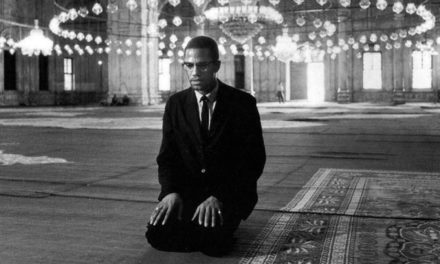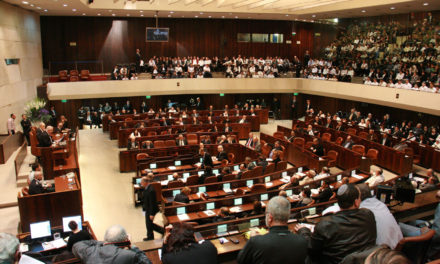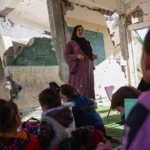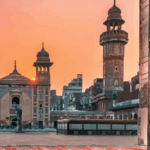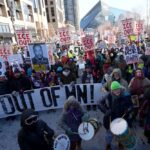MEMBERS OF THE INTERNATIONAL COURT OF JUSTICE ON DECEMBER 2, 2019, AT THE PEACE PALACE IN THE HAGUE, THE SEAT OF THE COURT. (PHOTO: UN PHOTO/ICJ-CIJ/FRANK VAN BEEK. COURTESY OF THE ICJ. ALL RIGHTS RESERVED.)
The opening salvo of South Africa’s legal bid to hold Israel accountable for genocide in Gaza rang out this morning in a crowded courtroom in The Hague.
The State of Israel has failed to prevent and is continuing to commit acts of genocide against the Palestinian people of Gaza, lawyers for the Republic of South Africa told the International Court of Justice, gathered in the ornate chambers of The Hague’s Peace Palace.
Standing at a podium in front of the Court’s fifteen judges, supplemented by judges ad hoc Aharon Barak (Israel) and Dikgang Ernest Moseneke (South Africa), and in front of a battery of lawyers and scores of diplomatic observers, South African attorney Adila Hassim spelled out the acts Israel has committed against the Palestinian people of Gaza – acts defined as genocidal under Article II of the 1948 Convention on the Prevention and Punishment of the Crime of Genocide.
Over the past three months, Israel has waged the heaviest conventional bombing campaign in the history of warfare, Hassim told the court, dropping 6000 bombs per week, including 2000-lb bombs on hundreds of occasions.
Over 23,000 Palestinians have perished, 70% of them women and children, Hassim told the court. At least seven thousand are unaccounted for, dead or dying beneath the rubble. “No one has been spared. Not even babies.”
Physically, Gaza is in ruins, Hassim continued. Homes, shelters, hospitals, schools, mosques, and churches have all been destroyed.
Irish attorney Blinne Ní Ghrálaigh was particularly graphic. Quoting UN officials, Ní Ghrálaigh described Gaza as “a crisis of humanity,” a “living hell,” a “bloodbath,” and a “situation of utter, deepening, and unmatched horror where an entire population is besieged and under attack, denied access to the essentials of survival on a massive scale.”
Pending the court’s determination of the merits of South Africa’s genocide charges (something that will take years), South Africa is asking the ICJ, as a matter of “extraordinary urgency,” to issue a “provisional measures” order – an injunction — instructing Israel to “immediately suspend” its military operations in Gaza, to “take all reasonable measures” to prevent genocide, to “desist” from genocidal acts set forth in Article II of the 1948 Genocide Convention, to halt genocide incitement, conspiracy and complicity, and to ensure that evidence of this “crime of crimes” is preserved.
Eighty-four pages in length and exceptionally detailed, South Africa’s application exceeds what would ordinarily be required in a request for provisional measures, legal authorities told Mondoweiss, prior to today’s hearing.
“It is substantive, it is evidence rich,” says Michael Lynk, Canadian legal scholar and former UN Special Rapporteur on the human rights situation in the Occupied Palestinian Territory. “If anybody wanted a single reference to be able to understand what’s going on for the last twelve weeks with respect to the war on Gaza, this is the document with respect to that.”
“Normally, this kind of detail, you would wait for the underlying merits,” says Susan Akram, Professor of Law at Boston University, and director of BU’s International Human Rights Clinic.
“What’s required [in a preliminary measures application] is a prima facie [case], showing sufficient plausibility of evidence, and enough available evidence without the particulars being proven up by documentary and testimonial evidence,” Akram says. “But they’ve done their homework.”
No greater homework for South Africa’s lawyers than proving specific Israeli intent to destroy the Palestinian people in whole or in part — dolus specialis, in legal jargon.
Unlike run-of-the-mill war crimes like indiscriminate targeting of non-combatants and civilian infrastructure, enforced starvation, torture, and forcible displacement, genocide is defined as a crime of “specific intent” – demonstrated or inferred from public statements and “patterns of conduct.”
In today’s court hearing, South African lawyers argued that Israel has indeed waged its war “with the requisite specific intent … to destroy Palestinians in Gaza as a part of the broader Palestinian national, racial and ethnical group.”
“The evidence for genocidal intent is not only chilling, it is also overwhelming and incontrovertible,” South African attorney Tembeka Ngcukaitobi told the court, itemizing flagrantly genocidal statements by top Israeli leaders, cabinet ministers, and military officers, including conversations with Israeli soldiers heading off to Gaza.
A video of Benjamin Netanyahu conjuring up the annihilation of the Amalekites was projected on a court screen behind the justices. So was a video of Israeli soldiers dancing and crying out ecstatically, “there are no uninvolved civilians,” and “may their village burn; may Gaza be erased.”
Ngcukaitobi told the court about “snuff videos” posted by IDF recruits on social media; about a soldier boasting about the village he’d helped destroyed, and about an Israeli pop singer saying, “Gaza must be wiped out and destroyed with every Amalek seed. We simply must destroy all of Gaza and exterminate everyone who is there.”
Genocidal intent is “not out on the fringes,” Ngcukaitobi told the judges. It’s “embodied in state policy.”
Outside observers agree.
“These are not rhetorical statements,” Katie Gallagher, senior staff attorney with the U.S. Center for Constitutional Rights, told Mondoweiss. “Israeli officials at this level say what they mean and then do what they say.”
“Intent is normally the most difficult element to prove, but I think in this case, the Israeli government and the individuals who are prosecuting this war have made it very clear,” Susan Akram told Mondoweiss. “They meant to kill as many as possible. And the intent to transfer as many as possible outside of their territory; and then also to place and enforce a punitive siege that makes life difficult or impossible, so that their survival is clearly at risk. And that is the stated intention. So, I think in this case, the intent is not nearly as difficult to prove as in so many other genocide cases that have been decided.”
“This is not simply a war on Hamas,” Michael Lynk told Mondoweiss. “It also has the appearance of wanting to thin out Gaza; of encouraging the remaining Palestinians that there’s nothing to return to; that you may as well go to the Sinai; you may as well file your applications to Italy or to Canada, or to Australia to go live … [Bezalel Smotrich], who talked about wanting to reduce Gaza’s population from 2.3 million to roughly one or 200,000 Palestinians.”
Among the most relevant South African claims the ICJ will weigh in assessing Israeli genocidal intent: the high number of child casualties and alleged measures to prevent births.
The direct connection between child deaths, injury, trauma, and the genocidal destruction of a people has already been brought to the ICJ’s attention.
In mid-November, in a joint “Declaration of Intervention” to the ICJ regarding The Gambia v. Myanmar – the first genocide case brought by one country against another at the top UN court, in 2019 – Canada, Denmark, France, Germany, the Netherlands, and the UK called on the court to broaden its interpretation of the Genocide Convention. Among other expanded interpretations of the Convention, Canada and its five allies declared that the ICJ should consider that acts of genocide “need to be assessed differently when the acts are committed against children.”
“[The] targeting of children provides an indication of the intention to destroy a group as such,” they argued, and “evidence of harm to children may contribute to an inference that the perpetrators intended to destroy a substantial part of the protected group.”
Israeli leaders have responded to these charges in a predictable fashion. Following South Africa’s submission of the application to the court, the Israeli Foreign Ministry called the case a “blood libel.” More prosaically, Israeli President Isaac Herzog described South Africa’s application as “atrocious and preposterous.”
Still, Israel is worried. “A ruling by the court could have significant potential implications that are not only in the legal world but have practical bilateral, multilateral, economic, security ramifications,” says an Israeli Foreign Ministry cable, obtained by Axios.
Israeli worries are well founded. The prohibition against genocide is both a jus cogens norm (binding on all, without exceptions) and erga omnes partes (all 153 state parties to the Genocide Convention are obliged to enforce it), South African jurist and former UN Special Rapporteur John Dugard told the ICJ’s fifteen justices this morning.
Fending off a procedural argument Israel is likely to make tomorrow that there is no “dispute” between South Africa and Israel and that there’s certainly not been any attempt at negotiations, Dugard described various communications South Africa had with Israel regarding its concerns over genocide. Among these, propositions that Israel had opposed. South Africa’s propositions were not only factually wrong, Israel argued, but “obscene,” Dugard recounted to the court.
Israeli lawyers will have a chance to rebut South African claims of procedure and fact tomorrow.
A provisional measure ruling from the court is anticipated by the end of January.
“I do expect that if there was a provisional measures order calling on Israel to stop its actions, it would increase the political and diplomatic pressure on Israel, on the United States, and on the Security Council to bring an end to what’s been going on,” Michael Lynk told Mondoweiss.
“If there were a provisional measures decision that comes out from the ICJ, it [would make] crystal clear to the United States, to Western powers, to all states that they are under an obligation, a binding obligation, to take measures to prevent genocide and to cease any assistance to genocide,” says Katie Gallagher, with the Center for Constitutional Rights (CCR).
As it happens, the CCR is in the midst of a lawsuit against Joe Biden, Antony Blinken and Lloyd Austin at a California District Court on behalf of a half dozen Palestinian NGOs and individual plaintiffs. They are seeking an injunction halting U.S. military support for Israel and anticipate that a provisional measures order from the ICJ, in South Africa’s case, would strengthen theirs.
If Washington doesn’t help enforce a provisional measures order against Israel by the IJC, in South Africa’s lawsuit, other state parties would.
“Under Article 41 of the ICJ statute, the ICJ should refer immediately provisional measures to the Security Council,” Susan Akram told Mondoweiss. “Now, of course, we know that the U.S. is going to [veto] any measures against Israel at the Security Council, but that does nothing to prevent all states, individually and regionally, for example Africa, to comply in a range of ways: suspend relations with Israel … and take whatever measures they wish to take or should take, under Article 1 of the Genocide Convention, to make the provisional measures binding.”
